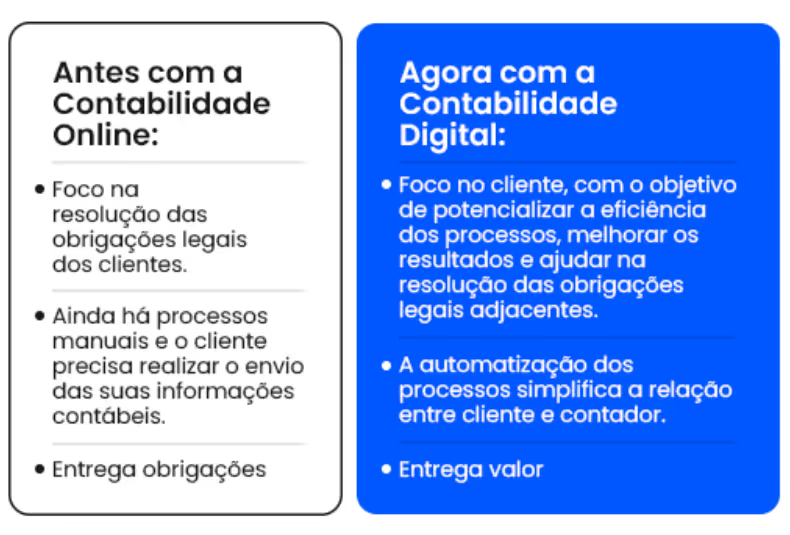Online vs. Traditional Accounting: the digital evolution of the accounting market
Accounting is directly linked to the analysis of facts and acts of an economic-financial nature, aimed at assisting in planning, control, studying their consequences and best practices.
This sector has been present since the beginning of civilization, in which accountability, tax and accounting bookkeeping, financial transaction records, tax calculations, monitoring of accounts, income and expenses were already common. These are some of the most common activities associated with the area.
Regarding the execution of these activities, they required time and, occasionally, generated a considerable increase in costs and labor. However, even though it was a conservative area, the implementation of technologies was necessary.
According to a survey published by an American company, there was a considerable change in professional behavior, since 72% of people use mobile technology to deal with everyday issues.
That said, these digital accounting processes are fundamental for your business to have good financial health and to comply with the law.
In this article you will understand how important it is to implement online accounting, its advantages, how to apply it to your company, and know how to differentiate its different types of execution. Shall we go?
What is traditional accounting?
This accounting method takes place in an analogical way, in which accounting information and similar financial data sets are stored in hard copies or stored on a local hard drive, with all documents physically arranged in the offices.
Nowadays, traditional accounting refers to something conventional and common, since its processes require more time for execution and preparation. These processes take place as follows: clients and employees pass on information via a telephone, the office draws up the necessary documentation, the information is checked by both parties, and then this cycle resumes.
It is a model that is characterized by face-to-face service, provided within the accounting office, through a routine of tasks and protocols. In this routine, there is a large accumulation of information and volume of papers, which can leave the work susceptible to error and possible problems.
The application of this model in your company causes a certain deficiency in relation to competitiveness in the market, since this is a model considered outdated and of high cost.
What is online accounting?
This method was born through changes in behavior in society, since it accompanies these behaviors, transforming and adapting according to social needs.
Online accounting has therefore become known for the automation of accounting services, reducing costs for offices. In this model, the services promise to be faster, easier, and unlimited. These technological advances help to reduce the need for travel, bureaucracy, and other problems that traditional accounting brought.
An important milestone for the implementation of this model was made through the Public Digital Bookkeeping System (SPED), of the Federal Revenue Service, which requires taxpayers to comply with their tax obligations digitally, through an online signature, but that they are legally validated by a digital certificate.
To help you understand more about this scan, here are three articles that can help you: All about digitizing documents, Understand the TTRT-e and how the accountant transfers their clients and Accounting in the eradigital.
In addition, when we talk about digital accounting, we need to talk about Accounting 4.0. This model is made through the evolutionary combination of the previous ones, through a set of automated functions that alter the way in which professionals deal with the execution of their activities.
With this model, there are no expenses with paper, time and much less with low efficiency. This is the right model for those who currently want to grow with their office and need to be in evidence in the market.
What are the main differences between these two models?
Knowing and understanding the difference between online and traditional accounting will help you and your business to choose the best model based on what best suits your objectives.
To begin to talk about these differences, it is necessary to make their definitions evident:
“traditional accounting is a model that encompasses processes for accounting for the financial transactions of a business and the transactions are traditionally recorded manually on columnar papers. On the other hand, online accounting, also known as cloud accounting, has its execution process carried out using software and technologies”.
So here are some of the differences between these two models:
- Operating speed:
Online accounting uses the cloud, which ends up making the model operate at high speed. This high speed is achieved by inserting data into the software, allowing for faster reports, unlike the traditional model.
- Backups:
Traditional accounting has a disadvantage in this regard, as there is a great chance of data loss. This data may be lost due to its local storage and in paper form, as there may be external factors that damage them.
With regard to online accounting, this risk is reduced because the storage is carried out using software, on the hard disk and other units that allow data to be backed up.
- Costs:
In financial matters, online accounting is even more economical. This is due to the greater accessibility of the software and accounting licenses. Traditional accounting, on the other hand, requires several expenses with office supplies, which is one of the main expenses for small and medium-sized companies.
Also, for the avoidance of doubt, here's a comparison of their differences:

10 benefits of digital accountants compared to traditional accountants:
With the global scenario, the adaptation of the various sectors to the implementation of the technology was extremely urgent. According to the report of Work trends announced by Microsoft, global social behavior changed significantly, since about 85% of Brazilian employees say that their productivity was not affected by changes in the way they work, hybrid and remote.
“There's no way to erase the lived experience and the lasting impact of the past two years, as flexibility and well-being have become non-negotiable for employees. By embracing and adapting to these new expectations, organizations can steer their team and business toward long-term success.”
Jared Spataro, corporate vice president of Modern Work at Microsoft
Regarding the accounting sector, the adaptation to these technologies would not be different. The traditional accounting approach was affected and gave way to online accounting, here are some benefits of digital accountants:
- Flexibility:
Currently, online accountants offer packages that fit in your pocket. You can define what type of benefits you want, you can choose and change the packages at no cost. In addition, there are also packages that you pay only when you use them, thus ensuring your loyalty and the right approach for your business.
- Better planning:
This advantage allows you to have access to your documents 24 hours a day, 7 days a week, and to manage your finances in a planned way according to your current needs. Here you can make short, medium and long plans without having to leave your house and having everything registered in the palm of your hand.
- Reduces task execution time:
With the use of technological innovations and optimization software, you have a reduction in the execution time of the tasks and, consequently, greater freedom to manage them. Since the time to prepare a quote or payment does not require third parties and can be made using any mobile device.
- Better decisions:
With the right information you can make better decisions, and that also applies to your business. Online accounting provides the information to make better decisions, meaning you spend less, generate more revenue, and still make more profit.
- security:
The use of software allows greater security, as everything is done using bank-level encryption as standard. That way, your data is as safe as possible and is not susceptible to viruses or hackers.
The impact of digitization on the traditional accounting system:
Automation and the implementation of new technologies in the accounting sector bring several benefits to clients and offices, as they bring innovation for small and medium-sized businesses and enable greater market adherence through the implementation of online accounting.
Until recently, accountants carried out the manual execution of processes in companies, but that is not the scenario that we currently see in the largest accounting offices. This professional has left his manual processes and has become a professional with strong strategic and creative characteristics.
It is clear that accounting 4.0 is here to stay and to expand more and more, but caution is needed when choosing software and applying documents online.
With that in mind, Clicksign is the ideal solution to accelerate the growth of your business! If you want to know more about how Online Document Signing can revolutionize your processes and help you become an online accountant, click here and talk to an expert.











